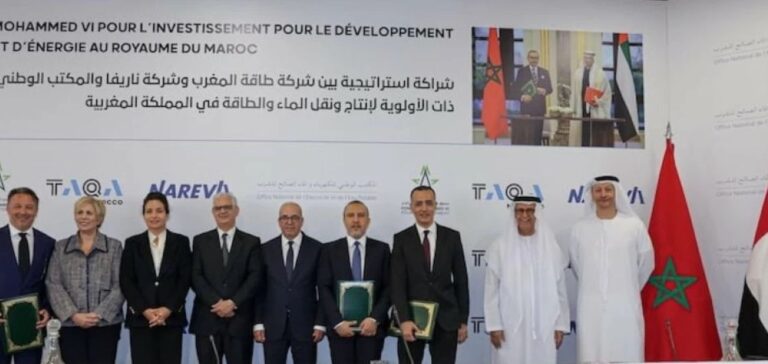The Government of Morocco, the Office National de l’Électricité et de l’Eau Potable (ONEE), and an Emirati consortium have signed three memoranda of understanding to develop a nationwide energy and water infrastructure programme. The initiative stems from a joint declaration signed in December 2023 between King Mohammed VI and the President of the United Arab Emirates, Mohamed bin Zayed Al Nahyan.
An HVDC line to strengthen electrical interconnection
The programme includes the construction of a 1,400-kilometre high-voltage direct current (HVDC) transmission line linking the south to the centre of the country. This infrastructure is designed to carry up to 3,000 megawatts of electricity, supporting the transmission of energy generated from renewable sources. In parallel, an additional 1,200 megawatts of renewable capacity will be integrated into the national grid.
Additionally, a combined-cycle natural gas power plant will be developed in Tahaddart, with an installed capacity of 1,500 megawatts. The first development agreement for this project has already been signed, though no overall financing amount has been disclosed to date.
A water component powered by renewable technologies
The project also includes the construction of desalination plants with a combined annual capacity of up to 900 million cubic metres of water. These units will be powered exclusively by renewable energy sources. A related initiative involves the annual transfer of 800 million cubic metres of water between the Oued Sebou and the Oued Oum Rabia.
The overall funding for these infrastructures will be provided by the consortium, made up of the Mohammed VI Fund for Investment, TAQA Morocco – a subsidiary of the Abu Dhabi National Energy Company (TAQA) – and Nareva. The resources will be raised from both national and international financial institutions.
A partnership aligned with bilateral relations
TAQA Morocco, which currently supplies approximately 34% of national electricity demand, is strengthening its footprint in the kingdom through this strategic partnership. The company, also active in desalination, will play a central operational role in the deployment of the projects.
This programme aligns with Morocco’s energy goals, which aim to exceed 52% of installed capacity from renewables by 2030. It also reflects the growing economic and technical ties between Rabat and Abu Dhabi, with a focus on joint ventures and knowledge transfer to sustainably structure the kingdom’s energy and water resources.






















